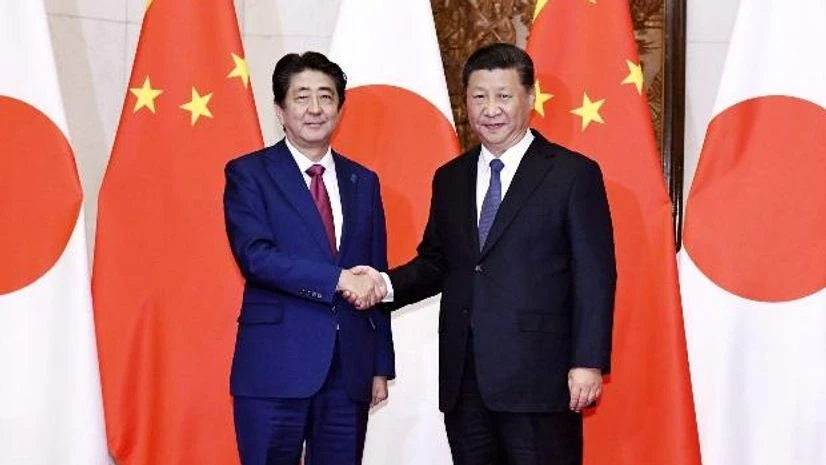Japan pledged to "actively participate" in China's ambitious Belt and Road Initiative (BRI) as the two nations on Friday shed their bitterness over territorial disputes and vowed to promote economic cooperation during talks held between the leaders of Asia's two biggest economies on improving ties amid their trade friction with the US.
Japanese Prime Minister Shinzo Abe, who is on a rare visit to Beijing, held talks with his Chinese counterpart Li Keqiang and called on President Xi Jinping.
The multi-billion dollar BRI project has evoked global concerns over growing indebtedness of small countries to China.
The two countries have agreed to create a "new framework" to jointly move ahead with infrastructure projects in third nations and strengthen a wide range of cooperation ranging from finance to innovation, Japanese news agency Kyodo reported after Abe's meeting with Xi.
"Japan has also expressed its readiness to actively participate in the BRI...We are now actively conducting third market cooperation. We are looking for more proactive cooperation in this regard," Chinese Foreign Ministry spokesperson Hua Chunying told media here on Friday.
"We will build the third-party cooperation as a new pillar of our cooperation," she said.
More From This Section
India is opposed to the BRI as it includes the China-Pakistan Economic Corridor (CPEC), which transverses through Pakistan-occupied Kashmir.
According to observers, China has begun warming up to India and Japan, two of its most significant neighbours, as it grapples with a trade war initiated by the US President Donald Trump. Japan too is facing a trade dispute with the US.
The two sides also signed several agreements after Abe and Li's meeting on Friday. The two leaders also met on Thursday.
Abe's visit to Beijing comes days ahead of Prime Minister Narendra Modi's visit to Japan to boost bilateral ties.
The agreements included cooperation in state-of-the-art technology and protection of intellectual property rights, as well as to resume their currency swap line in times of financial emergency, Kyodo reported.
The delegation of Abe, who is the first Japanese premier to visit China in seven years, included about 1,000 Japanese businessmen. Li said they had signed 500 agreements worth $18 billion.
The central banks of the two countries also signed a three-year, bilateral currency swap agreement enabling both sides to swap up to about $28.8 billion.
"Switching from competition to collaboration, I want to lift Japan-China relations to a new era... Japan and China are neighbours and partners. We will not become a threat of each other," Abe told Li.
During his meeting with Abe, Xi said, "As the international situation changes, China and Japan are becoming increasingly dependent on one another."
He said the two neighbours have a growing number of common interests and concerns on a multilateral level. "The rapid changes in the world are providing China and Japan with opportunities for more in-depth cooperation," Xi said.
The Japanese TV NHK quoted Abe as saying, "I want to use my visit as an opportunity to elevate the Japan-China relationship to a new phase from competition to cooperation...We need to maintain and further develop fair and free trade systems...we want to work with China for the peace and stability of the world, and the region, and that's what countries around the world expect of us."
In an apparent reference to Japanese invasion in an early 20th century during which the Japanese army was accused of committing massive human rights violations, Xi said, "China and Japan have interacted for more than 2,000 years...In that long history, there were deplorable times and the Chinese people suffered tremendously."
Besides the rancour over Japanese army committing alleged human rights violations, ties between the two countries hit rock bottom in 2012 after Japan purchased some of the disputed islands in the East China Sea from their Japanese owner.
While Japan calls the islands Senkakus, Chinese refer to them as Diaoyu islands. Though Japan controls the islands, both China and Taiwan make their claim over them.

)
